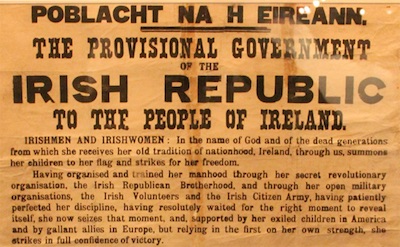
The second in a two-part historical feature by Michael Green of Ireland-Information.com
On Easter Monday, 24th April, 1916 the GPO was occupied by the revolutionary forces. Pearse read the Proclamation of the Republic to a bemused gathering:
POBLACHT NA H EIREANN
THE PROVISIONAL GOVERNMENT
OF THE
IRISH REPUBLIC
TO THE PEOPLE OF IRELAND
IRISHMEN AND IRISHWOMEN: In the name of God and of the dead generations from which she receives her old tradition of nationhood, Ireland, through us, summons her children to her flag and strikes for her freedom.
Having organised and trained her manhood through her secret revolutionary organisation, the Irish Republican Brotherhood, and through her open military organisations, the Irish Volunteers and the Irish Citizen Army, having patiently perfected her discipline, having resolutely waited for the right moment to reveal itself, she now seizes that moment, and, supported by her exiled children in America and by gallant allies in Europe, but relying in the first on her own strength, she strikes in full confidence of victory.
We declare the right of the people of Ireland to the ownership of Ireland, and to the unfettered control of Irish destinies, to be sovereign and indefeasible. The long usurpation of that right by a foreign people and government has not extinguished the right, nor can it ever be extinguished except by the destruction of the Irish people. In every generation the Irish people have asserted their right to national freedom and sovereignty; six times during the last three hundred years they have asserted it to arms. Standing on that fundamental right and again asserting it in arms in the face of the world, we hereby proclaim the Irish Republic as a Sovereign Independent State, and we pledge our lives and the lives of our comrades-in-arms to the cause of its freedom, of its welfare, and of its exaltation among the nations.
The Irish Republic is entitled to, and hereby claims, the allegiance of every Irishman and Irishwoman. The Republic guarantees religious and civil liberty, equal rights and equal opportunities to all its citizens, and declares its resolve to pursue the happiness and prosperity of the whole nation and all of its parts, cherishing all of the children of the nation equally and oblivious of the differences carefully fostered by an alien government, which have divided a minority from the majority in the past.
Until our arms have brought the opportune moment for the establishment of a permanent National, representative of the whole people of Ireland and elected by the suffrages of all her men and women, the Provisional Government, hereby constituted, will administer the civil and military affairs of the Republic in trust for the people.
We place the cause of the Irish Republic under the protection of the Most High God. Whose blessing we invoke upon our arms, and we pray that no one who serves that cause will dishonour it by cowardice, in humanity, or rapine. In this supreme hour the Irish nation must, by its valour and discipline and by the readiness of its children to sacrifice themselves for the common good, prove itself worthy of the august destiny to which it is called.
Signed on Behalf of the Provisional Government.
Thomas J. Clarke,
Sean Mac Diarmada,
Thomas MacDonagh,
P. H. Pearse,
Eamonn Ceannt,
James Connolly,
Joseph Plunkett
The Volunteers seized and fortified six positions In Dublin city: the GPO, the Four Courts, Boland’s Mill, St. Stephen’s Green, Jacobs Factory and the South Dublin Union. Attempts to seize Dublin Castle and Trinity College failed. This latter failure severely restricted the Volunteers mans of communicating with each other.
The failure of the country to rise made it impossible to prevent the arrival of English reinforcements. By Wednesady the revolutionaries were outnumbered by 20 to 1. The English secured a cordon about the city and closed in. They concentrated their attack on the GPO whilst none of the other strongholds came under the same sort of concentrated bombardment.
A gun-ship, the Helga, arrived in Dublin and field-guns were mounted on Trinity College. The effect of the continuous shelling of O’Connell St. virtually destroyed it and the surrounding areas. By Friday the GPO was engulfed in flames and Pearse gave the order to surrender. 450 people, many of whom were civilians, were dead with over 2500 wounded. The city was in ruins with the damage estimated at a massive 2 Million pounds.
Over 3,500 people were subsequently arrested country-wide (including DeVelera and Collins), although 1,500 were freed after questioning. 1,841 of these were interned without trial in England, and 171 were tried by secret court martial resulting in 170 convictions. 90 were sentenced to death but 75 of these sentences were commuted to life imprisonment. The seven signatories of the proclamation of independence (Pearse, Connolly, Clarke, MacDonagh, MacDermott, Plunkett, and Ceannt) were all executed to the outrage of the Irish public who had now begun to revise their opinion of the insurgents to that of a heroic nature.
EFFECTS OF THE REBELLION
The rising was critical in terms of the overall fight for an Irish Republic. For the first time the masses of the country wanted an end to English rule. Nationalism swept the country especially as the details of the secret executions became known.
National attention was brought to the Irish cause and to the oppressive ways in which the English ruled the country.
These realisations were in all probability the main aim of the insurgents. The War of Independence which followed in 1919, the subsequent Civil War of 1922, the formation of the Irish Free State in 1923 and the declaration by Costello of an Irish Republic can all be traced back to the events of Easter week, 1916.
![[Irish Republican News]](https://republican-news.org/graphics/title_gifs/rn.gif)
![[Irish Republican News]](https://republican-news.org/graphics/title_gifs/harp.gif)

